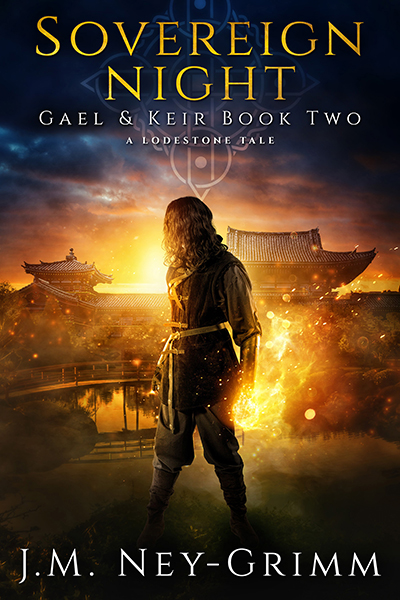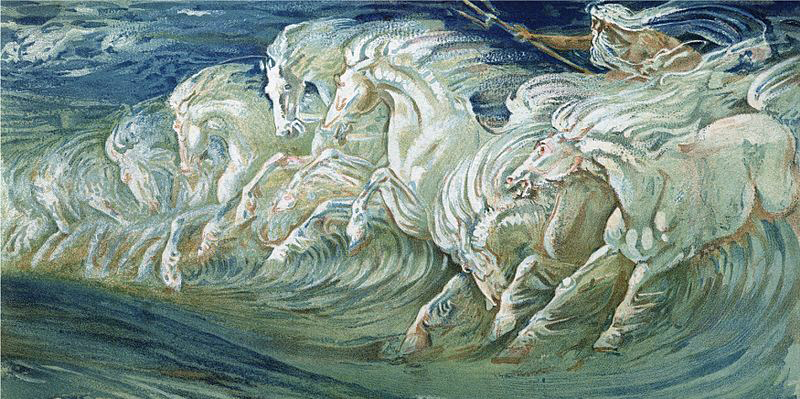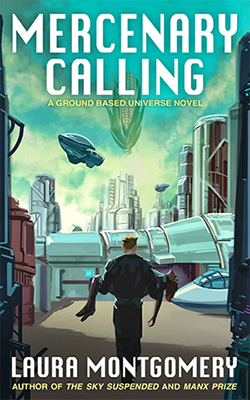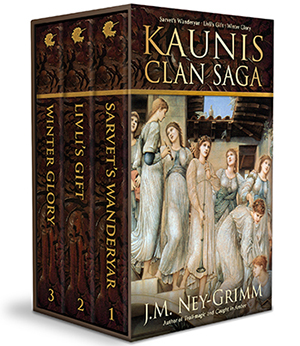 The physician addressed Hew. “I am Medicus Piar. Let me see your hand.”
The physician addressed Hew. “I am Medicus Piar. Let me see your hand.”
Piar wore a crisp blue tunic of linen and presented an impression of controlled efficiency. The symptoms of his troll-disease were mild, save for his ears, which were large, with drooping lobes. Gael wondered that the medicus cropped his straight, dark hair so short. Many trolls preferred to hide their ears.
Hew, confronted with the request that he remove his arm from its sling, looked again at the bronze scissors and knives and calipers on the tray of tools, and shrank.
Piar, seemingly unfazed by his patient’s recalcitrance, turned to Gael.
“Secretarius, you’ve given him preliminary treatment?”
“I did nothing for the burn, I’m afraid,” answered Gael. “Merely for his pain.” Would Piar be jealous of his physician’s prerogative?
Apparently not, for he returned his attention to Hew, unperturbed.
“Did the ministrations of the secretarius hurt you?” the medicus asked.
Hew shook his head.
“Mine will not hurt either.” Piar’s smile was brief and tight, but it reassured Hew. He proffered his hand, sling and all.
Piar pushed the canvas back, took a swift glance at Hew’s oozing palm, and passed into manipulation of the energea without even an in-breath, merely closing his eyes. Were healing disciplines so different from other uses of magery? Or was Piar simply that practiced, that he needed no preliminaries?
Gael allowed his inner sight to open, curious about Piar’s methods.
Interestingly, Piar’s energea flowed from the tips of his fingers, not the palm, and it was violet, not blue. Was that why his troll-disease seemed so little advanced for his age, which Gael judged to be about thirty years? Gael noticed that Piar pulsed his energea, as well as giving it a buzzing vibration.
“Mm, mm,” mumbled Hew.
Gael closed his inner sight to check Hew’s wound with his outer sight. The red of the palm had faded to pink, and the broken skin no longer wept.
Someone rapped on the wooden frame of the open door.
Piar opened his eyes. “Come in,” he said, studying his patient’s hand.
A troll about Keir’s age entered the room.
“What is it?” asked Piar, touching each of Hew’s fingertips in turn and noting their response.
“Medicus, sir.” The young assistant shuffled his feet. “Rainar told me to deliver the sleeping draught now, but the herbalist says he’s not compounded it.” The boy’s voice rose with his distress.
Piar turned Hew’s hand, checking the motion of the wrist. Gael liked how thorough he was, not shorting his patient, despite the interruption.
“No. One night’s dose proved adequate. The order’s been canceled. Tell Rainar so, please,” instructed Piar.
“Yes, sir. Thank you, sir.” The assistant stepped back through the doorway, and Gael heard him murmuring to someone else in the hallway, his voice growing fainter as they moved away. “The castellanum doesn’t want it anymore. Cancelled his order.”
Gael frowned. Theron had ordered a sleeping draught? How distinctly odd. The castellanum was autocratic, patronizing, jealous of his privilege, and patrician in his refinement, but never anxious. The idea of him suffering insomnia was . . . ludicrous.
Piar reached for a small stone jar and a narrow bronze spatula resting on the sideboard. With a swift, light touch he spread ointment on Hew’s burn, and began wrapping it with linen bandage. “How did this happen?” he asked.
Hew fumbled in his sash with his uninjured hand and drew out . . . a nugget of tin.
Gael choked. Cayim’s hells! Was everyone stealing his tin? Even the sweeps?
Hew’s face fell. “Oh,” he wailed. “It was so pretty! Like a falling star, all bright and shining! I tried to catch it, and I did.” He stared, heartbroken, at the lump of silvery gray metal in his hand.
Gael was beginning to understand. “Had you never swept the smithies before?” he asked.
Hew shook his head. “Samo said I done such a good job on the stairs, I could. As a reward! And then I saw such pretty stars, wasted on the floor. I saved one! But it’s gone dull!” His mouth trembled.
Gael stifled the hilarity that rose through his weariness. “Hew, the metal glows when it is very hot. It’s beautiful, but you cannot touch it then without serious injury. Do you understand? The brightness fades as the metal cools.”
Hew handed the lump of tin to Gael. “I didn’t know,” he said humbly. “I thought it was a star, and stars belong to everyone who can see, don’t they? But metal belongs to you.” He ducked his head. “I’m sorry.”
Gael accepted the tin and sighed. “You’re a good boy, Hew.”
Hew’s face brightened. “I am?”
“You are. You don’t steal. And you’ll know not to touch hot metal the next time you sweep the smithies, won’t you.”
Hew brightened still more. “I’ll sweep the smithies again? I’ll see the stars of hot metal?”
“I’ll request you especially,” Gael promised. “When you’ve healed. You cannot push a broom until your hand is well.”
Hew looked at his bandages in surprise as Piar rearranged the sling, slipping it back under the boy’s arm and hand.
“I’ll keep him here overnight,” said Piar. “Samo gives you your work?” he asked Hew.
Hew nodded, still scrutinizing his bandages.
Piar smiled his quick, tight smile, looking at Gael. “I’ll send word to Samo of what’s happened, so the boy does not get in trouble.”
The physician rose. “I think you’re done here, Secretarius.”
Indeed.
He now knew that Theron needed to give a better briefing to the scullions who cleaned the smithies. He knew Hew to be honest. And he knew he must seek his thief elsewhere.
Which was probably just as well. How could Belzetarn prosper, if even its lowliest denizens proved untrustworthy?
On the other hand . . . if the lowly were innocent, then the guilty one lived among the powerful.
Next scene:
The Tally Master, Chapter 4 (scene 20)
Previous scene:
The Tally Master, Chapter 4 (scene 18)
Need the beginning?
The Tally Master, Chapter 1 (scene 1)










